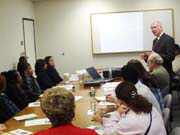In the conference room, Peter Burmeister looked something like a college professor as he stood near the table. The lights were dimmed. A video unit projected images onto a screen while playing a country and western song called “Keep the Faith.”
This was not a traditional lesson, not a training session for county workers on the latest bookkeeping technology or ordering goods. It was a classroom study on ethics – helping county workers realize what standards are expected of them and how to recognize the signs that something around them might be wrong.
Burmeister, a businessman whose firm was hired earlier this year by the county to provide counter-corruption courses to county employees, says he has seen corruption in nearly every aspect during his 37 years in the business world, and hopes to help county employees recognize the basic signs in the work place.
“I’m no novice. I may not look it, but I’ve got street smarts. I’ve seen every kind of kickback scheme you can imagine,” he said.
During a recent interview with WNJN-TV Reporter Michael Aaron, indicted Hudson County political operative Paul J. Byrne stated that corrupt political leaders needed “willing helpers” within their workforce to facilitate these corrupt leaders’ wrongdoing.
It is precisely that kind of culture of corruption new Hudson County Executive Tom DeGise is seeking to reform with his latest effort to improve Hudson County government’s ethical climate: professional, corporate-style ethics training for county employees.
DeGise has made ethics a priority of his administration and said that unethical behavior will not be tolerated in Hudson County government.
“Our workers need to know that they are not to tolerate unethical conduct and that we have a procedure in place for them to report it,” said DeGise. “Over the last 10 months I have been in office, we have worked hard to develop a comprehensive approach to reforming how business is done in county government.”
In establishing the Board of Ethics, Hudson County is now among a handful of counties throughout the state with their own board, capable of investigating complaints against county officials. The board has the power to subpoena people and hire an attorney. It can also offer advice to public officials and county employees on proper ethical behavior.
As part of the ordinance, the officials and employees would have to abide by a code of ethics – which would also be based on the state model. State law requires personal financial disclosure for its public officials, the forced establishment of blind trusts for those officials invested in companies doing business with the state, and disclosure of interests in companies that do business with the state government. The state regulations also cover a range of issues such as gifts public officials can take from a lobbyist, who a public official can represent as a lobbyist once out of office, and other issues.
About 15 employees made up the first ethics class and were presented with the seminar in a meeting room on the fourth floor of the County’s Annex building on Pavonia Avenue. The series of lectures is being presented by Metropolitan Strategies, of which Burmeister is president. His firm has often lectured on corporate ethics prior to this.
Can Hudson do business ethically?
A new county code of ethics defines what is ethical and what is not.
The point of the seminar was to show workers what unethical behavior looks like and what its cost is.
“Taxpayers don’t get what they have paid for, services aren’t delivered, people become cynical about government, careers are destroyed and people feel betrayed and angry,” Burmeister told the first group of county workers during their instruction.
He pointed to the recent conviction of Freeholder Nidia Davila-Colon, the guilty plea of former County Executive Robert Janiszewski for extortion and the charges filed against Freeholder Bill Braker as signs of a culture of corruption the instruction was designed to prevent.
The ground rules of the lesson were simple: Keep stories told in that room confidential. The workers were not to divulge specifics of what went on between workers and Burnmeister’s staff nor divulge the ideas.
Metropolitan Strategies will provide 90-minute training sessions to all full-time employees over the next year and will provide the training in person or on video to all new full-time employees as part of their orientation. The training looks at the rationale for and value of an ethical workplace environment, how to evaluate ethically-challenging situations, and the mechanics of how to file an ethics complaint with the newly-created County Ethics Board.
Late last year, after two freeholders were indicted by the federal government, DeGise introduced an ordinance that established a six-member board made up of people with reputations for integrity and a significant knowledge of governmental affairs.
The ordinance fulfills a promise DeGise made during his campaign for county executive, and is part of an effort to reduce or eliminate corruption.
Although the state model upon which the ordinance is based would allow some public officials to sit on the board, Burmeister said the board hopes to shape the Hudson County version into one that will provide a positive antidote to the county’s reputation for corruption.
He said Sunday school lectures typical of ethics programs elsewhere won’t suffice in Hudson County.
“That kind of thing won’t fly here,” he said.
